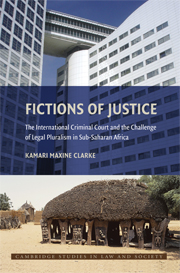 Fictions of Justice
Fictions of Justice Book contents
- Frontmatter
- Contents
- Preface
- Acknowledgments
- Introduction: The Rule of Law and Its Imbrications – Justice in the Making
- PART ONE THE PRODUCTION OF LIBERALIST TRUTH REGIMES
- 1 Constructing Fictions: Moral Economies in the Tribunalization of Violence
- 2 Crafting the Victim, Crafting the Perpetrator: New Spaces of Power, New Specters of Justice
- 3 Multiple Spaces of Justice: Uganda, the International Criminal Court, and the Politics of Inequality
- PART TWO THE RELIGIOUS POLITICS OF INCOMMENSURABILITY
- Epilogue: Toward a Critical Transnational Legal Pluralism
- Notes
- Bibliography
- Index
- CAMBRIDGE STUDIES IN LAW AND SOCIETY
1 - Constructing Fictions: Moral Economies in the Tribunalization of Violence
Published online by Cambridge University Press: 23 January 2010
- Frontmatter
- Contents
- Preface
- Acknowledgments
- Introduction: The Rule of Law and Its Imbrications – Justice in the Making
- PART ONE THE PRODUCTION OF LIBERALIST TRUTH REGIMES
- 1 Constructing Fictions: Moral Economies in the Tribunalization of Violence
- 2 Crafting the Victim, Crafting the Perpetrator: New Spaces of Power, New Specters of Justice
- 3 Multiple Spaces of Justice: Uganda, the International Criminal Court, and the Politics of Inequality
- PART TWO THE RELIGIOUS POLITICS OF INCOMMENSURABILITY
- Epilogue: Toward a Critical Transnational Legal Pluralism
- Notes
- Bibliography
- Index
- CAMBRIDGE STUDIES IN LAW AND SOCIETY
Summary
Understanding the tribunalization of African violence and the rise and expansion of the rule of law campaign in sub-Saharan Africa involves asking how various factors have led to conditions such that it is Africa and not Europe, the Sudan and Uganda and not the United States, for example, that are subjects of the ICC. Asking why Africa and in what context, rather than simply asserting the need for the implementation of human rights norms, allows us to focus on the ways that human rights principles travel, how they are transmitted, propelled, anchored, and in the end, how they bury the normative political apparatus that constitutes them as distinct.
Significantly, although the idea for the International Criminal Court (ICC) was presented not long after World War II, any such plans were deferred because of the Cold War. At the close of the Cold War, a growing arms trade began to fuel African conflict zones in which rebel groups were vying for regional power. The literature on civil wars in the region (Rwanda, the Democratic Republic of Congo [DRC], Ethiopia and Eritrea, Sierra Leone, Liberia, and Nigeria; e.g., Collier and Hoeffler 1998; Abdullah 2000; Hirsch 2001; Ross 2004) establishes histories of violence and struggle in which it is often the regulatory forms of resource control that are ultimately at issue. The problem: throughout the 1990s, in regions such as Rwanda, Sierra Leone, the Ivory Coast, the DRC, and Uganda, many resource-related conflicts and their resolutions, despite obvious connections to global trade circuits, found little international support – especially compared with the significant international brokering at the end of the Cold War and the formative international justice interventions at the end of World War II.
- Type
- Chapter
- Information
- Fictions of JusticeThe International Criminal Court and the Challenge of Legal Pluralism in Sub-Saharan Africa, pp. 45 - 88Publisher: Cambridge University PressPrint publication year: 2009


